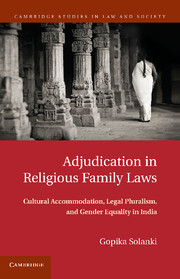 Adjudication in Religious Family Laws
Adjudication in Religious Family Laws Theoretical Framework and Arguments
Published online by Cambridge University Press: 03 May 2011
Introduction
In this chapter, I discuss the shared adjudication model; that is, the manner in which the Indian state shares adjudicative power with religious/societal bodies and actors in the regulation of marriage and divorce among Hindus and Muslims. This model produces justice that is multilocational, and each adjudicative site – formal or informal – provides a forum for interaction between state and societal laws and legal actors. I trace the nature of state-society relations at the interface of personal laws in diverse state and nonstate legal forums, and assess their impact on cultural accommodation and gender equality in Hindu and Muslim personal laws.
This chapter is divided into three sections. The first section classifies state and nonstate societal legal organizations and agents. The second section focuses on state-society relations in interpenetrative official and unofficial legal forums. I argue that state and nonstate actors engage in conflict, cooperation, negotiations, and communication over the content of laws governing marriage and divorce in multiple adjudicative locales. As a result, the statist version of the conjugal family and the notions of rights and obligations in marriage and divorce are destabilized, transformed, adapted, or unmade in a variety of legal settings. The third section discusses how postcolonial states might balance religious groups' demands for autonomy in the governance of the conjugal family and ensure gender equality.
To save this book to your Kindle, first ensure [email protected] is added to your Approved Personal Document E-mail List under your Personal Document Settings on the Manage Your Content and Devices page of your Amazon account. Then enter the ‘name’ part of your Kindle email address below. Find out more about saving to your Kindle.
Note you can select to save to either the @free.kindle.com or @kindle.com variations. ‘@free.kindle.com’ emails are free but can only be saved to your device when it is connected to wi-fi. ‘@kindle.com’ emails can be delivered even when you are not connected to wi-fi, but note that service fees apply.
Find out more about the Kindle Personal Document Service.
To save content items to your account, please confirm that you agree to abide by our usage policies. If this is the first time you use this feature, you will be asked to authorise Cambridge Core to connect with your account. Find out more about saving content to Dropbox.
To save content items to your account, please confirm that you agree to abide by our usage policies. If this is the first time you use this feature, you will be asked to authorise Cambridge Core to connect with your account. Find out more about saving content to Google Drive.